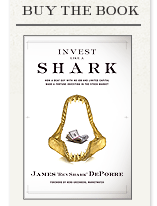Q & A
How did the loss of your hearing start your investing career?
I dealt with some minor hearing loss as I was growing up but it became dramatically worse after I had finished school and began a career as an attorney. One day while struggling to hear a client on the telephone, it became clear to me that I could no longer function effectively, and my career as an attorney was over. Having lost my career, most of my assets, a means of making a living, and even my marriage, I was depressed and confused about what to do with my life. This was in the early 90's as various Internet services such as Prodigy and CompuServe were beginning to gain prominence. Since I couldn't communicate normally, I fumbled around on the Internet looking for some sort of human interaction to ease my isolation. I eventually latched on to stock market related message boards and spent time chatting and studying the activity. The postings on the Internet provided great insight into the psychology, thinking and emotions of investors, and that intrigued me greatly. Although I had little experience in the stock market, I began to try various techniques. I had mixed success for a while, but eventually things began to come together. I called this approach Shark Investing and that is the foundation of my book, Invest Like a Shark .
How did you become know as “Rev Shark”?
As I grew to understand the way the stock market worked, it became very evident to me that many people were sucked into approaching it in a way that guaranteed mediocre results. I decided to make it my mission to “save souls from buy and hold” by spreading the idea that small individual investors need not be passive guppies. I was particularly bothered by what I felt was the condescending preaching, not only by traditional Wall Street, but by well-meaning advisors who only thought about the market in the standard mutual fund model. I thought it was important that I be aggressive and forceful in spreading the idea that individual investors should look at the market differently because they are not big institutions and can be flexible. I started using the screen name ‘RevShark' as I spread the gospel of Shark Investing. Over time, a group of online investors came to understand how empowering the approach was and embraced many of my concepts.
Did you initially start your investing career following the advice to buy and hold? When and why did you abandon that approach?
Like most new investors I tried a number of different investing approaches as I sought the best results. I tried holding what I thought were safe ‘blue chip' stocks like IBM, Coca-Cola and Merck for the long run but became quite discouraged as they did very little over the years. I wanted better and faster results, and since I had little money to work with and could move very quickly, it seemed obvious that I should try to find a more active approach. It seemed logical to me that I could obtain better results by being reactive to market changes and moving fast as they occurred rather than by waiting for years and hoping that something positive might eventually occur at some future date.
Why did you decide the time was right to write this book?
I have been communicating my Shark Investing principles on the Internet for over a decade through a wide variety of forums, including RealMoney.com and my own website, SharkInvesting.com. From my e-mail and online interaction, I knew that many folks had benefited from my thoughts, but were initially uncertain as to how to put the ideas to work in an effective manner. With the market becoming increasingly challenging and many small investors feeling like they have no control over their investing fate, I felt it was a perfect time to crystallize and summarize the concepts in one place.
Why call yourself a “shark” investor? What does this signify?
Sharks are one of nature's most efficient predators and have survived in their current form since prehistoric days. They are nature's most efficient eating machines, and I wanted to apply that ruthless and methodical approach to making money in the stock market. When I started investing in stocks, I had limited capital and no job. The idea of losing money was out of the question. As a result, I expended a lot of energy making sure that I keep my precious capital safe by booking my profits aggressively when I had them and exiting quickly when I didn't like what was happening. In this regard, my methods mimicked those of sharks in that they will be very aggressive in seeking food but will quickly turn and run when they sense danger. Moreover, sharks tend to hunt in waters that are teeming with activity. One of the main tenants of Shark Investing is to seek out investment opportunities in stocks that are attracting a lot of attention (typically by other traders or by large institutional investors), and strike aggressively when you have an edge.
Why does the philosophy of buy and hold remain popular among investors if it doesn't produce very good results?
The buy-and-hold philosophy remains so prevalent even in this age of investor empowerment simply because it makes good business sense for traditional Wall Street to promote such an approach to investing. Most money managers are paid depending on the amount of assets under management , not on the returns they are able to generate for their clients. Moreover, mutual funds are required to stay invested at all times, and success is measured solely on if they are able to outperform their benchmark indices, not generate real returns.
Does being a shark investor mean taking a lot of risks? Is this form of investing not for the faint of heart?
One of the biggest, and most dangerous, investing myths is that being a passive, long-term investor is somehow safer than being an aggressive and active investor. Investors have been brainwashed by Wall Street into thinking that if they just let their money sit there, they will eventually produce huge gains like a Warren Buffett. The truth is that it is extremely difficult and very risky to try to buy good stocks that you profit from greatly over the very long-term. For most investors, it is safer and easier to act using aggressive Shark Investing tactics that not only protect capital from the unknowns and dangers of the market but also aggressively pursue profits when you have the best conditions in place to do so.
I contend that it is the investor who buys a stock and holds on to it through thick and thin who is the real risk-taking gambler. By avoiding the need to be an active participant in their portfolios, not only do they expose themselves to unnecessary risk should the broader market weaken, but they can also miss out on gains in other areas by tying up their capital in yesterday's winners that have already had their day in the sun.
The aggressiveness of the shark is what keeps it safe and prospering. The passivity of the minnow is what makes it lunch for others.
Do you think there is more interest among individuals today in controlling their own investments? If so, why is this happening?
Without question individual investors want to be empowered to manage their own investments, but they tend to feel lost and uncertain. Most go about doing it in the wrong way because they have been brainwashed by traditional Wall Street into being passive and anticipatory. Once they understand that being an active investor actually keeps them safer and helps them lock in gains methodically they are much more willing to embrace the challenge of investing. You need to have some success to gain confidence and to continue working at it, and with the proper application of Shark Investing methods that tends to happen faster.
How can people start to think like a shark investor? Does it require a new way of looking at Wall Street and business?
Above all else Shark Investing is a mindset. It requires that you look at the stock market differently than you have in the past. You need to understand why traditional Wall Street tends to push you to be passive and slow in dealing with the market. You need to understand the great power that you have in the ability to sell holdings quickly and easily. You need to embrace the fact that you are small and nimble, and can use a style that big investing ‘Whales' can't possibly use. You have tremendous flexibility as a small investor, but Wall Street wants you to squander it by investing as if you are a miniature mutual fund.
What are three tips that you would offer anyone curious about shark investing and how to start using this technique themselves?
The first thing you have to do is to change your thinking about how you approach the market. If you aren't managing a billion dollar mutual fund, then don't invest like you are. The second key step is to adopt a stock management system where you cut losses aggressively, take gains systematically and are not afraid to use the great power of selling. The third step is to not give up. If you keep losses small, you can just keep on plugging along until things fall into place. The nature of the market is that if you stick with it long enough, you will eventually find success.





